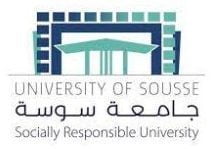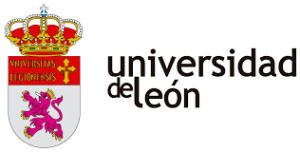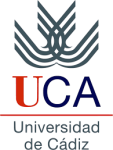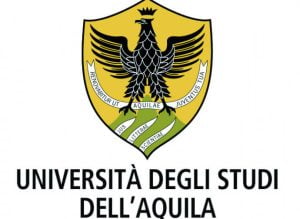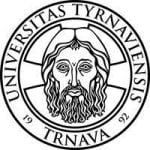- Univ. of Sousse
- Univ. of León
- Univ. of Cadiz
- Univ. of Aquila
- Univ. of Trnava
Uso - University of Sousse, Tunisia
Established in 1986, the University of Sousse is now a leading Tunisian public Higher Education organization bringing together 17 faculties, institutes, high schools, and 26 Research Units in a wide array of subjects ranging from exact to human sciences, from accounting to anthropology, and from marketing to medicine. In a dynamic and sustained scientific endeavour, the university has over the last few years promoted indexed research, certified training, and accredited education in its institutions. The University of Sousse has also been developing a vibrant international profile of partnership and cooperation with UN organizations, European agencies, civil society associations, and HEIs from all over the world. It took part in Tempus 25 projects, and it is currently actively involved in Erasmus+ KA1 program with 12 signed inter-institutional agreements and Erasmus + KA2 capacity building program with 5 accepted projects.
The University of Sousse has been recently accredited to be an autonomous scientific and technological public organization and therefore accreditation is seen as an ongoing process should its all other 17 establishments follow. To mention, the University of Sousse has a dynamic and prominent high schools and institutions that are highly experienced in domains of engineering and leader in quality assurance development. For instance, the National School of Engineering of Sousse, the Higher Institute of Computer Sciences and Communication Techniques of Hammam Sousse, and the Higher Institute of Applied Sciences and Technology of Sousse represent the real core of developing accreditation system of Engineering Study Programmes.
The University of Sousse will actively collaborate to promote the implementation of an on-line Quality Assurance (QA) and an accreditation system of Engineering Study Programmes (ESPs in its institutions as to develop specialized professional competencies and teaching staff in this specialization. One of the main strategic objectives of the University of Sousse is enhancing study program quality to catch up with the ongoing globalization and international job market needs. The quantitative and qualitative departments existing in the three High schools/Institutions: the National School of Engineering of Sousse, the Higher Institute of Computer Sciences and Communication Techniques of Hammam Sousse, and the Higher Institute of Applied Sciences and Technology of Sousse will efficiently boost the success of installing an on-line Quality Assurance (QA) and an accreditation system of Engineering Study Programmes (ESPs) in the Mediterranean Area through the previous experiences they have and the competencies they offer today. Mainly, we can say that these institutions are the most active in terms of platforms development and the openness on the socio-economic environment.
ULe - University of León, Spain
is a public institution of higher education and research founded as an autonomous entity in 1979. It is based on two campuses, in the cities of León and Ponferrada and the total number of students is currently 14,000 from which around 1,000 are international students from more than 50 different countries. It offers a full range of undergraduate, master's and postgraduate degrees adapted to the European Higher Education Area in all branches of knowledge, organized in 10 different schools: Engineering, Economics, Education, Languages and Philosophy, Veterinary, Biology, Law, Health Sciences, Mining Engineering and Agricultural Engineering. Each school features libraries and IT rooms and there are central libraries at each campus. Moreover, the University has a sports centre, language centre, Confucius and Camoes Institutes, cafeterias and many other amenities. The University of León complements its teaching and research activities with a wide variety of training workshops, university extension courses, cultural and sporting activities, boosting business creation, supporting innovation, international cooperation and exchange, working with both young and older people... all of this with the aim of becoming an integral part of our community.
ULE has strong links with institutions and companies with more than 2,400 agreements and collaboration frameworks and has signed bilateral exchange agreements with prestigious Universities from more than 40 countries.
ULE is part of the European University on Responsible Consumption and Production (EURECA-PRO) and has received the accreditation as a Campus of International Excellence and several degrees have been awarded international quality accreditations: the Computer Engineering Bachelor has been awarded the EUR-INF and the Veterinary School the EAEVE. Moreover, some of their programmes are taught jointly with renowned centres abroad: a European Master in Business Studies, with the EPAS accreditation and double degree international programs in Mechanical Engineering, International Commerce and Tourism.
ULE´s International Relations Office provides individual assistance to foreign candidates throughout the admission process. To ease the international students’ arrival and help them settle into life in León or Ponferrada, ULE offers a welcome week and buddy program, and several activities are organized along the year like an International Week, International Coffees… The University also provides a wide range of services including sports and cultural activities.
In this project the ULE will commit all of its decisive bodies with competences in curriculum development: starting with the academic boards of the two engineering centres, their Deans offices, the Student Administration Services and the Quality Assurance Office. In addition, the International Project Office will support all project execution issues, regarding the tight follow-up of the grant agreement, the justification of costs and the contribution towards interim and final reports.
UCA – University of Cadiz, Spain
Spanish university with over 1,700 academics and 21,884 graduate, master and doctoral students with 15 faculties located in 4 University Campuses. The academic offer encompasses all branches of knowledge, offering a total of 44 Degrees (20 of them double degrees); 56 Official Master Programs (2 Erasmus Mundus) and 19 Doctorate Programs. UCA also leads the European University SEA EU project formed by six universities.
UCA has undertaken in the past years a global approach to internationalisation, envisioning the joint action and overlapping of Teaching, Research, Technology Transfer and Innovation areas, and the cooperation with companies. Key points to define such a strategy are the EU policies (Horizon 2020 program, Erasmus+ program, etc.), the Spanish and Andalusian Government policies (International Excellence Campuses strategy and RIS3, respectively) and the acknowledgement of its own unique characteristics (historical, geographical and scientific strengths). Internationalisation is no longer an isolated milestone.
Searching for excellence is a priority. Europe, Latin America and Northern Africa have been traditional geographical areas for cooperation due to their geostrategic location and historical background. The internationalisation policy of the university is based on four main strategic lines:
- Building strategic partnerships with universities of similar size and common interests in order to establish joint research projects through: co-directed Bs C. and Ms. thesis, double degrees especially at master level, co-tutelled Ph.D thesis and interuniversity master and Ph. D. programmes within the framework of the Erasmus Mundus projects.
- Cooperation with companies. This has been undertaken through the creation of a new unit: the General Direction of University and Companies (GDUC) where teaching and research is connected to company needs through traineeships and the services chart of the University (presenting the technology offer of the research groups).
- The development of networks on specific subjects to promote cooperation, application to international calls, students and staff mobility and joint research projects connected with Ph. D. and Ms. Thesis.
- Quality assurance and audits.
UNIVAQ - University of Aquila, Italy
UNIVAQ counts presently 19.000 students, 644 teachers-researchers, 504 administrative and technical staff. Research and teaching are provided by 7 Departments which offer 30 Bachelor Degrees, 32 Master degrees, 4 single Master degrees, 11 PhD Schools, as well as several specialisation schools, specializing-master courses and vocational courses. 10 curricula provide joint or multiple degrees, 4 are recognized EMJMD excellent. UNIVAQ hosts the following.
Excellence Research Centers:
- CETEMPS – Centre of Excellence in Telesensing of Environment and Model Prediction of Severe Events
- DEWS - Design Methodologies of Embedded Controllers, Wireless Interconnect and Systems-on-chip
- EX-EMERGE - Centre of Excellence on Connected, Geo-localized and Cyber-secure vehicles
The last two are part of the proposing department DISIM. The Research Centers are:
CERFIS - Research and Teaching Centre for Earthquake Engineering
- CITRAMS - Sustainable Transport and Mobility Research Centre
- DMTA - Molecular Diagnostics and Advanced Therapy Research Centre
- M&MOCS - International Research Centre on Mathematics and Mechanics of Complex Systems worldwide well known, contribute to provide the students with an international and scientific environment on the crucial fields of the present society.
In the last five years the University was coordinator or partner in more than 30 projects, within Horizon. In line with the European policies the University started a strict cooperation with the entrepreneurial world developing specific strategies and programs also for PhD in enterprises. The policy aiming to become an international reference point for a globalised knowledge world for higher education and research allowed the cooperation with several Universities from EU and Third Countries. Many new activities have been promoted in the Research and Technology Transfer Area, through the Technology Transfer Office, the University Research Office, the International Projects Office, the International Relations Office.
The University of L’Aquila will contribute to AIRES in development of general design and organization of the Master, in definition of the syllabus, in teaching and training activities, making available its labs and facilities, and it will support the consortium in management.
UT - University of Trnava, Slovakia
is the oldest university in Slovakia, established in 1665 and then re-established in its modern form in 1992. It has five faculties: law, philosophy, health sciences and social work, theology, and pedagogy. The Faculty of Health Sciences and Social Work was established in 1994 and was the first university in Slovakia to offer full time master programs in the field of public health. Currently it offers Bachelor, Master and Ph.D. programs as well as a manager oriented post gradual MPH program. The faculty has been increasingly involved in research projects on a European and Global scale, which is documented by a large number of high-level peer reviewed publications published by faculty and research staff. The faculty has a powerful know-how in teaching public health and in establishing general public health and specialised curricula, both in Slovakia and abroad. The track record of the institutions and the involved staff will ensure the successful implementation of the projects.
UT will be involved in the development of educational modules and training materials (in the field of public health research, health impact assessment, health promotion policies and evidence-based public health policy), in the dissemination of the project and its portfolio, contributing to the quality assurance evaluation and participating to the organising the final project conference

